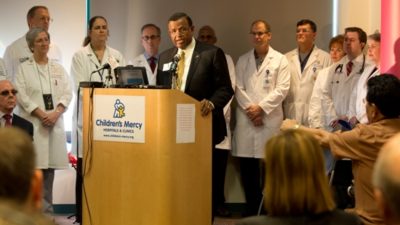Kansas City’s Big 5 Priorities Are Advancing
Kansas City’s top civic priorities – the “Big 5” – are advancing on multiple fronts after two years of cooperative effort, and the University of Missouri-Kansas City is playing a major role in that progress.
That was the message from a Big 5 Update held Sept. 19 at Union Station. “Champions” of the five civic goals presented progress reports at the session.
Much attention was focused on the Big 5 goal to establish a Translational Medical Research Center in Jackson County. Jackson County voters are being asked to approve a half-cent sales tax that would raise $40 million a year to boost existing medical research efforts at UMKC, Children’s Mercy Hospitals and Clinics, Saint Luke’s Health System and the Kansas City Area Life Sciences Institute. The Greater Kansas City Chamber of Commerce, the driving force behind the Big 5, has endorsed the campaign to pass the proposal.
The concept for the translational medicine institute – designed to advance scientific discoveries into patient treatments and cures – has been an integral part of the community’s agenda since the Stowers Institute for Medical Research was established in 1994, said Dr. Patrick James, champion for the goal and senior medical director for Quest Diagnostics. From the beginning, it was seen as part of a larger collaborative picture that also included the formation of the regional life sciences institute and gaining National Cancer Center designation for the University of Kansas Medical Center.
“This is a historic opportunity,” James said. “This is the century of biology, and we really need to capitalize on that.”
The institute would be on Hospital Hill, the location of UMKC’s health sciences campus that includes the Schools of Dentistry, Medicine, Nursing and Health Studies and Pharmacy. Students and faculty from those schools collaborate in translational research as do the Schools of Computing and Engineering, Biological Sciences and Education, the Department of Psychology and the Office of Research and Economic Development. Already, civic leader Donald J. Hall Sr., and the Hall Family Foundation, have pledged to pay for construction of a $75 million state-of-the-art research facility to house the Institute.
Momentum already exists in terms of both research advances at the member institutions, and the economic development potential of life sciences in the region. Between 2009 and 2012, James said, the number of life science companies in greater Kansas City increased 17 percent, while the number of jobs increased 21 percent.
UMKC’s proposed Downtown Campus for the Arts also reported significant progress. UMKC Chancellor Leo E. Morton, champion for that goal, described the impact of the $20 million challenge grant offered by the Muriel McBrien Kauffman Foundation toward completion of the $70 million first phase of the project. Phase I calls for moving UMKC’s acclaimed Conservatory of Music and Dance to a site in the Crossroads District near the Kauffman Center for the Performing Arts. Subsequent phases would move other university-based arts programs to the site.
“After two years, I still believe the Downtown Campus for the Arts is an awesome, transformative idea where everybody wins,” Morton said. Not only will Conservatory students and faculty have sufficient space and improved facilities, but will enrich – and be enriched by – the ongoing artistic ferment in the Crossroads. There will be benefits for non-Conservatory students and the greater community as well, he added.
“Every student we graduate will have an uncommon appreciation for the arts,” Morton said, and therefore, the 75 percent of UMKC graduates who stay in the metro area after graduation “will be lifelong patrons of the arts.”
UMKC also plays a central role in the Big 5 effort to makes Kansas City “America’s Most Entrepreneurial City.”
“This is a movement, not an initiative,” said champion Peter deSilva, President and COO of UMB Financial Corp. The key is to view entrepreneurship not as a category, but as “the way we do things in Kansas City.”
He credited the UMKC-based KC SourceLink as a key asset. The support network for fledgling companies, he said, is “the place from which our movement will be sustained and grown far into the future.”
He also praised the “Startup Village” along State Line Road, where he said 24 companies creating 60 jobs have sprung up in less than a year. He also noted that the recently-opened Digital Sandbox KC, another UMKC-based project, has already helped two entrepreneurs advance their business concepts to the point where they qualified for federal grants.

